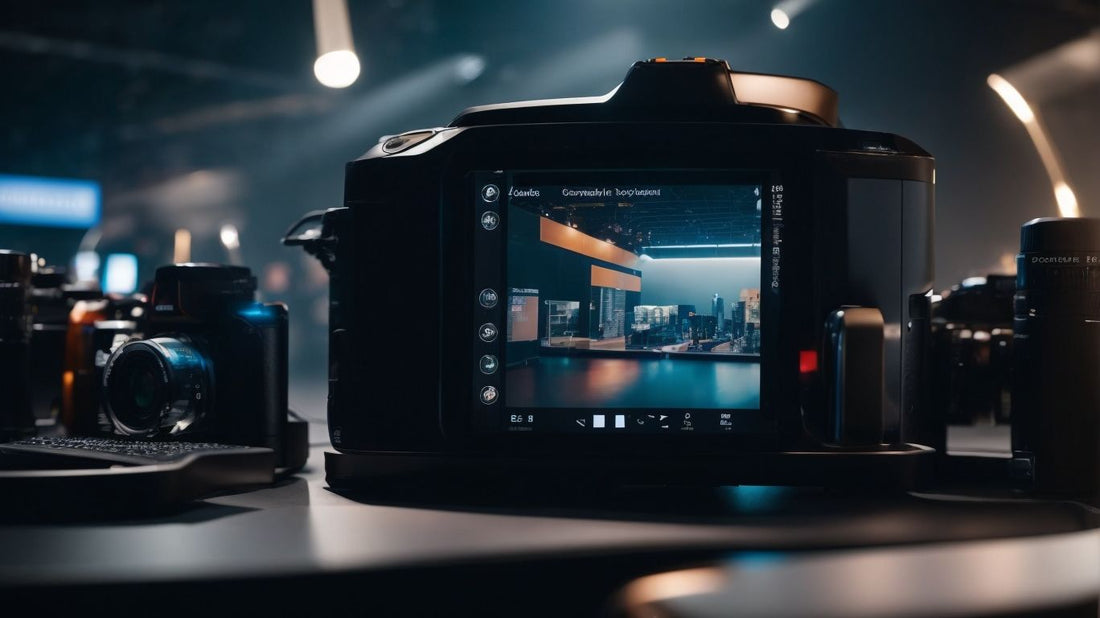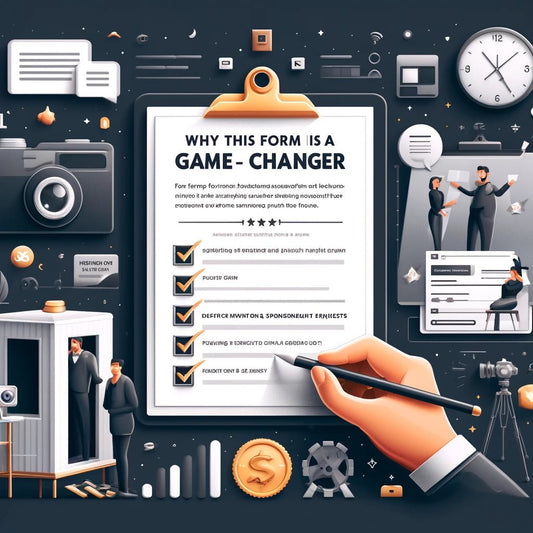
Maximizing Success: How Corporate Event Technology Enhances Productivity & Efficiency
Share
.jpg)
Corporate event technology has revolutionized the way businesses plan, execute, and enhance their events. With the integration of advanced technological tools and platforms, corporate events have become more streamlined, engaging, and impactful.
Corporate event technology refers to the use of digital tools, software, and platforms specifically designed to facilitate and enhance various aspects of corporate events. It encompasses a wide range of technologies that aid in event planning, attendee management, engagement, and execution.
The role of technology in corporate events is multi-faceted and impactful. Firstly, it streamlines the event planning process by automating tasks such as event registration, venue selection, and logistics management. Secondly, technology enhances the attendee experience by providing personalized and interactive features such as live polling, networking opportunities, and digital content sharing. Finally, it improves event execution through features like live streaming, real-time analytics, and on-site engagement tools.
There are various types of corporate event technology available to cater to different event needs. Event management software offers comprehensive solutions for end-to-end event planning and management. Event registration and ticketing platforms simplify the registration process and provide seamless attendee management. Mobile event apps offer a portable and interactive event experience. Audience engagement tools enable organizers to interact with attendees in real-time, fostering interactivity and participation. Virtual and hybrid event platforms enable remote attendees to participate in events.
Using corporate event technology offers several benefits. Firstly, it increases efficiency and productivity by automating manual tasks, reducing paperwork, and streamlining processes. Secondly, it enhances attendee engagement by providing interactive features and personalized experiences, resulting in higher attendee satisfaction. Lastly, it allows event organizers to gather actionable insights and data by analyzing attendee behavior, preferences, and event success metrics.
However, adopting corporate event technology does come with its challenges and considerations. Cost and budget implications need to be carefully evaluated to ensure the technology aligns with the event goals and budget. The complexity and learning curve associated with new technologies may require sufficient training and support for event organizers and attendees.
What is Corporate Event Technology?
Corporate Event Technology refers to the use of technological tools and solutions to enhance and streamline the planning, execution, and management of corporate events. What is Corporate Event Technology? It encompasses a wide range of technologies, such as event management software, mobile apps, virtual and hybrid event platforms, live streaming, RFID badges, and interactive displays. These technologies facilitate efficient registration, attendee engagement, networking, content sharing, and data analytics. Corporate Event Technology enables organizers to create immersive and interactive experiences, increase attendee satisfaction, improve event ROI, and gather valuable data for future event planning and decision-making. It has become an essential component in delivering successful and impactful corporate events.
The Role of Technology in Corporate Events
In the world of corporate events, technology takes center stage, revolutionizing the way we plan, experience, and execute these gatherings. From streamlining the event planning process to enhancing the attendee experience and improving event execution, technology is at the heart of it all. Get ready to dive into how the integration of cutting-edge tools and innovations is shaping corporate events, making them more seamless, engaging, and unforgettable than ever before. Let's explore the fascinating role of technology in this dynamic landscape.Streamlining Event Planning Process
- Incorporating the keywords "Streamlining Event Planning Process" into the text is crucial for successful corporate events. Here are steps to consider:
- Create a detailed event timeline with key milestones and deadlines to streamline the event planning process.
- Develop a comprehensive budget that covers all event expenses and contributes to streamlining the event planning process.
- Choose the right venue that accommodates the event needs and contributes to streamlining the event planning process.
- Utilize event management software to streamline tasks, such as registration, scheduling, and logistics, in the event planning process.
- Delegate tasks to a capable team and communicate responsibilities clearly to streamline the event planning process.
- Coordinate with vendors and suppliers to ensure timely delivery of resources and contribute to streamlining the event planning process.
- Implement effective marketing strategies to promote the event and attract attendees, which are essential for streamlining the event planning process.
- Ensure seamless communication among all stakeholders using collaboration tools, which significantly streamlines the event planning process.
- Regularly track and monitor progress to identify and address any issues that may arise during the streamlined event planning process.
- By streamlining the event planning process, organizers can save time, increase efficiency, and deliver successful corporate events.
Enhancing Attendee Experience
Enhancing the attendee experience is a crucial aspect of corporate events. To achieve this, event organizers can utilize various technologies that provide innovative and interactive features.
| Event apps: |
|---|
| - Enhance the attendee experience by offering personalized agendas, real-time updates, and networking opportunities. |
| Audience engagement tools: |
|---|
| - Drive attendee engagement by providing interactive polls, Q&A sessions, and live streaming options. |
| Virtual and hybrid event platforms: |
|---|
| - Enhance the attendee experience by enabling remote attendees to participate in the event, creating a seamless experience for both in-person and virtual participants. |
By incorporating these technologies, organizers can create a memorable and immersive experience for attendees, leading to increased satisfaction and participation. This ultimately contributes to the success of the corporate event.
Improving Event Execution
- Enhancing event execution is of utmost importance when it comes to the success of corporate events. Here are some steps to improve and refine the execution process:
- Establish clear objectives and goals for the event.
- Create a comprehensive event timeline to ensure effective planning and flawless execution.
- Collaborate closely with all stakeholders, including vendors, speakers, and attendees, in order to align expectations.
- Utilize event management software to streamline logistics, registration, and communication.
- Implement impactful event marketing strategies to boost attendance and participation.
- Provide thorough training to your event staff to ensure they are well-prepared to handle any challenges that may arise.
- Maintain regular communication with attendees to keep them informed and engaged throughout the event.
- Take advantage of event technology tools, such as live streaming and interactive features, to enhance the overall event experience.
- Conduct comprehensive post-event evaluations to gather valuable feedback and identify areas for improvement.
Types of Corporate Event Technology
Discover the exciting world of corporate event technology and the various types that can elevate your next business event. From event management software and registration platforms to mobile apps and audience engagement tools, we'll explore the cutting-edge solutions that can enhance your guests' experience. Plus, we'll uncover the latest advancements in virtual and hybrid event platforms, revolutionizing the way businesses connect with their audiences. Get ready to explore the dynamic landscape of corporate event tech!Event Management Software
Event Management Software is an essential tool for efficiently planning and organizing corporate events. This innovative software simplifies tasks like event scheduling, attendee registration, and logistics management. It offers a range of key features, including:
Investing in Event Management Software can significantly enhance your event organization, streamline processes, and optimize attendee satisfaction. There are several popular options available, such as Eventbrite, Cvent, and Bizzabo.
Event Registration and Ticketing Platforms
Event registration and ticketing platforms are an essential component for the success of corporate events. The utilization of these platforms offers a multitude of advantages:
- Efficient registration: These platforms streamline the registration process, enabling attendees to easily sign up and provide the required information.
- Customizable ticketing: By utilizing these platforms, organizers have the option to create personalized tickets, providing various ticket types such as VIP or early bird, and catering to the diverse needs of attendees.
- Secure payment processing: With the incorporation of these platforms, secure transactions for ticket purchases are ensured, granting peace of mind for both organizers and attendees.
- Attendee management: Organizers can effectively manage attendee details, including check-ins, ticket transfers, and cancellations through these platforms.
- Data collection: These platforms collect valuable data on attendee demographics and preferences, which aids organizers in making data-driven decisions for future events.
The utilization of event registration and ticketing platforms simplifies the event management process, maximizes attendance, and enhances overall attendee satisfaction.
Mobile Event Apps
Mobile event apps, such as mobile event apps, have become an essential tool for enhancing attendee experience and engagement at corporate events. Here are a few reasons why mobile event apps are so popular:
Mobile event apps, such as mobile event apps, have revolutionized the way corporate events are conducted, providing convenience, engagement, and personalized experiences for attendees. They have become a must-have tool for event organizers, empowering them to create meaningful and impactful events.
Audience Engagement Tools
Audience engagement tools are essential for corporate events as they can greatly enhance attendee participation and create interactive experiences. By incorporating various audience engagement tools, such as live polling and Q&A platforms, event organizers can enable real-time audience feedback and engagement. Additionally, incorporating gamification tools can encourage attendees to actively participate by offering challenges and rewards. Integrating social media platforms allows attendees to share their experiences and actively engage with event content. Moreover, virtual networking platforms can facilitate connections between attendees through chat, video calls, and matchmaking features. Lastly, interactive event apps provide personalized schedules, session ratings, and numerous engagement opportunities. By utilizing these audience engagement tools, organizers can boost attendee satisfaction, foster networking opportunities, and ultimately create a more memorable event experience.
Virtual and Hybrid Event Platforms
Virtual and hybrid event platforms have gained immense popularity in the realm of corporate events. These platforms provide a plethora of features and tools that elevate the experience of virtual attendees and ensure flawless event execution. Here are some key benefits of utilizing virtual and hybrid event platforms:
| Expanded Reach |
|---|
| - With virtual and hybrid events, participants have the flexibility to join from any corner of the world, resulting in increased audience engagement and participation. |
| Interactive Features |
| - These platforms offer various interactive features, such as live chat, polling, and Q&A sessions, fostering real-time engagement and interaction between attendees and presenters. |
| Customization |
| - Event organizers have the option to customize the platform to reflect their brand identity and create a tailored experience for their attendees. |
| Data Analytics |
| - Virtual and hybrid event platforms provide valuable insights and analytics on attendee engagement, session attendance, and overall event performance, enabling organizers to gather actionable data. |
| Cost-Effective |
| - Virtual and hybrid events often require lower investment in comparison to traditional in-person events, allowing for savings on travel, accommodation, and venue expenses. |
By incorporating virtual and hybrid event platforms, corporate events can undergo a revolution. These platforms offer flexibility, interactivity, and an expanded reach that enhances the attendee experience and helps achieve event objectives.
Benefits of Using Corporate Event Technology
With the rise of corporate event technology, a whole new range of benefits have presented themselves. From increased efficiency and productivity to enhanced attendee engagement, and the ability to gather actionable insights and data, this section explores the advantages of incorporating corporate event technology. So grab your notepads and get ready to dive into the exciting world of utilizing technology to revolutionize corporate events. No more boring meetings and lackluster experiences – it's time to harness the power of innovation!Increased Efficiency and Productivity
- Incorporating corporate event technology can lead to increased efficiency and productivity. There are several ways in which technology can enhance efficiency and productivity during corporate events:
- Automated processes: Utilizing event management software automates tasks such as registration, ticketing, and scheduling, which saves time and reduces manual errors, resulting in increased efficiency and productivity.
- Streamlined communication: Mobile event apps provide real-time updates and facilitate seamless communication between organizers, attendees, and speakers, contributing to enhanced efficiency and productivity.
- Improved planning and organization: Technology tools assist in managing event logistics, including venue selection, budgeting, and resource allocation, leading to more efficient planning and organization.
- Enhanced data management: By using event technology, better data collection and analysis can be achieved, providing valuable insights for optimizing future events and decision-making, ultimately increasing efficiency and productivity.
Enhanced Attendee Engagement
Enhanced attendee engagement is a crucial aspect of corporate events. To foster meaningful interactions and create a memorable experience, event organizers can leverage various technologies:
- Interactive Polling: Using audience response systems, attendees can actively participate in live polls and surveys, generating real-time feedback and encouraging enhanced attendee engagement.
- Networking Tools: Virtual event platforms and mobile apps offer features like matchmaking algorithms, chat functions, and virtual meeting rooms to facilitate networking and knowledge sharing, thereby enhancing attendee engagement.
- Gamification: By incorporating gamified elements such as quizzes, challenges, and leaderboards, event organizers can boost attendee participation and create a fun and competitive atmosphere, leading to enhanced attendee engagement.
- Live Q&A and Discussion Forums: Dedicated platforms allow attendees to ask questions, share insights, and engage in conversations with speakers and fellow participants, fostering deeper engagement and enhancing attendee engagement.
- Virtual Reality (VR) and Augmented Reality (AR): These immersive technologies can transport attendees to virtual worlds, enhance product demonstrations, or create interactive experiences that captivate and involve participants, resulting in enhanced attendee engagement.
In 1984, Apple held its annual shareholder meeting, distinguished by an electrifying moment. Steve Jobs unveiled the iconic Macintosh computer with a jaw-dropping demo that showcased the device's capabilities. This engaging event left a lasting impact, setting the stage for future technology unveilings and revolutionizing the world of corporate events.
Gather Actionable Insights and Data
One of the main advantages of utilizing corporate event technology is the capability to collect important information and analytics. This information can offer valuable insights for event planners to enhance future events and make data-driven choices. Here is an illustrative table showcasing how event technology can assist in gathering insights and data:
| Data Source | Insights Gathered |
|---|---|
| Event registration | Attendee demographics, preferences, and needs |
| Mobile event app | Attendee engagement levels and interactions |
| Audience polling | Real-time feedback and opinion analysis |
| Virtual event platform | Attendee participation and session analytics |
Challenges and Considerations in Adopting Corporate Event Technology
Adding a touch of creativity and burstiness, let's delve into the challenges and considerations faced when adopting corporate event technology. We'll uncover the ever-nagging concern of cost and budget, along with the complexity and learning curve that accompanies the utilization of this cutting-edge technology. Brace yourselves for a captivating exploration of the hurdles and potential solutions in this fast-paced world of corporate events. Get ready to unlock the door to a realm where innovation meets practicality.Cost and Budget
Considering the cost and budget is paramount when adopting corporate event technology. It helps businesses ensure they are making a wise investment and getting the most value for their money. Some factors to consider include licensing fees, setup and installation costs, hardware requirements, ongoing maintenance, and staff training expenses. By meticulously evaluating the financial implications, organizations can choose the most suitable technology that aligns with their budgetary constraints. It is also highly recommended to explore options like scalable solutions or flexible pricing models to optimize costs. Seeking recommendations from industry peers or consulting with experts can provide valuable insights into cost-effective solutions.
Complexity and Learning Curve
Adopting corporate event technology can pose challenges related to complexity and the learning curve. However, with the right proactive approach, these challenges can be effectively addressed. Here are a few tips to help you overcome the complexity and learning curve of corporate event technology:
Pro-tip: Take advantage of trial periods or demos offered by event technology providers. This will enable you to test the platform before committing, ensuring that it fulfills your specific needs and requirements.
Frequently Asked Questions
What is corporate event technology?
Corporate event technology refers to any tool, app, or software that helps plan, execute, and measure corporate events. It includes a wide range of digital tools and platforms that enhance event production, engagement, and overall attendee satisfaction rates.
How can digital transformation boost attendee satisfaction rates?
Digital transformation in the corporate event space can significantly improve attendee satisfaction rates. By incorporating innovative event technologies such as virtual reality (VR), augmented reality (AR), live streaming, and interactive event technology, organizers can create immersive experiences, foster meaningful connections, and streamline event planning processes to provide attendees with a more engaging and enjoyable event.
What is the impact of event tech stack on campaign effectiveness?
The event tech stack, which includes various software platforms and tools utilized for event management, marketing, engagement, and data analytics, has a positive impact on campaign effectiveness. With the right event technology, organizers can track campaign performance, measure event outcomes, and gain actionable insights to optimize future marketing strategies and maximize return on investment (ROI).
How can QR codes be used in corporate events?
QR codes have versatile applications in corporate events. They can be used for event registrations, ticketing, and simplified attendee sign-up processes. QR codes can also be incorporated into physical marketing tools such as event flyers, postcards, and even speaker business cards, allowing attendees to quickly access event-related information or promotional content using their smartphones.
What are the benefits of virtual events and event marketing tools?
Virtual events have gained popularity due to their flexibility, cost-effectiveness, and ability to reach a global audience. By leveraging event marketing tools, such as event marketing software and content marketing leaders, organizers can effectively promote virtual events, create engaging storytelling experiences, and attract their target audience. These tools enable organizers to maximize event exposure, generate registrations, and drive attendance for their virtual events.
Why is it important to choose the right event technology for corporate events?
Choosing the right event technology is crucial for corporate events as it can provide a competitive edge, enhance attendee experiences, and ultimately contribute to the success of the event. By investing in the latest event technologies and platforms, organizers can create immersive experiences, expedite check-in procedures with contactless check-in apps, collect valuable event data, and leverage analytics to make informed decisions for future events. Selecting the right event technology ensures that attendees' expectations are met, leading to memorable experiences and positive feedback.






